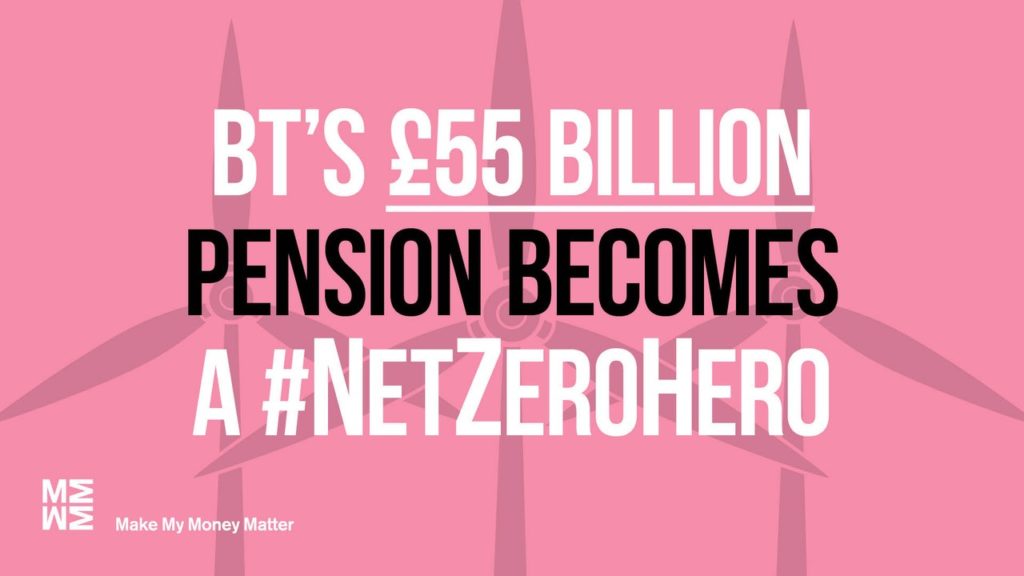Today, BT announced its £55bn pension fund – the UK’s biggest private company pension scheme managing the savings of over 300,000 people – is committing to Net Zero by 2035.
This announcement shows that our multi-trillion pound pension industry is the new frontier for purpose-led businesses.
Across the world, we’re seeing an explosion of activism of key issues – from MeToo on gender and Black Lives Matter on race to Fridays for the Future on climate change.
People are no longer waiting on politicians to change the world for them – they’re taking matters into their own hands and asking ‘what can I do to make a difference with my everyday actions?’
And they’re finding that answer in unexpected places. They’re finding it in the clothes they wear, the food they eat, and how they travel. They’re discovering it in the products they buy, the brands they engage with, and the companies they work for.
And the next big revelation is that they’re finding it in the places they put their money. Because – unbeknownst to most of us – our savings and pensions have made us accidental investors in many of the practices we avoid and the causes we fight against.
That’s why we believe that making your money matter will prove to be one of the most exciting and powerful steps individuals and corporates take over the coming years to build a better world.
Let’s look at why our money matters so much.
There’s £3 trillion invested in UK pensions alone, and that’s money owned by all of us. That’s more than enough to help deliver the Paris Climate Goals, support research into new vaccines, or fund critical green infrastructure.
But while investing in many vital businesses, UK pension funds have also been fueling some of the most unsustainable industries on the planet. From tobacco to fossil fuels, weaponry to gambling, pension funds have invested trillions on our behalf without asking us the crucial question – do these investments create a world we actually want to live in?
Why is it that the UK’s 3.5 million vegans are accidental investors in factory farming? How can it be that the pensions of scientists researching cancer treatments help fund the tobacco industry? And why is it that the pensions of our most sustainable businesses and our greenest MPs contribute to coal mining, oil extraction and deforestation?
In the short term, our money is contradicting our values. But more worryingly in the long term it’s undermining the viability of the very futures we’re saving for.
For purpose-led business, this issue is doubly important.
As organisations take important steps to reduce their carbon footprint, increase their corporate impact and deepen their connection to society, contradictions exists between these practices and the impact of their money.
Private sector company pensions schemes totalled more than 1,800 billion last year.1 Yet few make any effort to align their corporate sustainability activities with their pension contributions. This in spite of the fact that switching a company pension fund into more sustainable investment could make a significant contribution to cutting emissions and tackling social issues.
This represents a multi-billion-pound gap – with corporate sustainability commitments on one hand, and the contradictory impacts of their pensions on the other. This gap poses financial risks to companies, brand concerns for their consumers, and authenticity challenges amongst increasingly value driven, millennial employees, 70% of whom would invest their workplace pension in an ethical fund if available.2
But it doesn’t have to be this way. Business can reverse this trend and capitalise on an untapped opportunity for impact. Companies and their employees invest up to £20bn through pensions each year – money which could be directed toward clean energy, affordable housing, medical research and green infrastructure. Money which could help build a world fit for their employees’ retirement. And it doesn’t have to mean lower returns – the ethical fund of Nest, the UK’s largest pension provider, has been its highest performing fund over the past five years, showing where the real value lies.
If all companies aligned their pensions with their values, we could ensure the billions invested through corporate pensions help build a better world. After all, what’s the point of saving for retirement in a world on fire?
That’s why Make My Money Matter believes all organisations should follow BT’s lead, and ensure their pensions invest in people and planet. Find out more on how to take these steps and join Make My Money Matter here.
David Hayman, Campaign Director
- https://www.ons.gov.uk/economy/investmentspensionsandtrusts/articles/ukpensionsurveys/redevelopmentand2019results
- https://www.aviva.com/newsroom/news-releases/2020/10/our-call-for-pension-funds-to-be-net-zero-by-2050/
